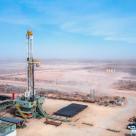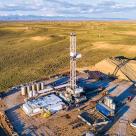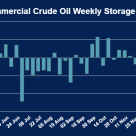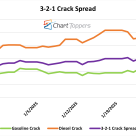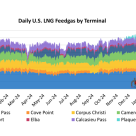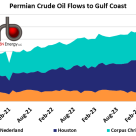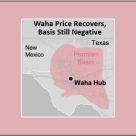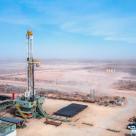Combined natural gas production of the equity partners in LNG Canada was 2.25 Bcf/d in December 2024 (combined height of the rightmost colored bars in chart below), a slight drop from the record 2.26 Bcf/d recorded for November, and 0.3 Bcf/d higher than one year ago.
Analyst Insights
Analyst Insights are unique perspectives provided by RBN analysts about energy markets developments. The Insights may cover a wide range of information, such as industry trends, fundamentals, competitive landscape, or other market rumblings. These Insights are designed to be bite-size but punchy analysis so that readers can stay abreast of the most important market changes.
Over the past two days there has been considerable attention given to the tariff impact of Canada’s crude oil, but there is a lot more involved.
Crude oil flows from the Permian Basin to Nederland, TX, remained stable in September 2024 for the fourth consecutive month, according to latest data from our Crude Oil Permian report.
Only a week ago on January 24, the February contract was the prompt month gas contract and traded above $4.00/MMBtu. That contract rolled off the board on Wednesday at $3.535/MMBtu after falling nearly 50 cents in just three trading days.
US oil and gas rig count posted its first weekly gain of the year, climbing to 582 for the week ending January 31 - an increase of six vs. a week ago according to Baker Hughes. This marks the first gain for rig count since December 6 of last year.
For the week ending January 31, Baker Hughes reported that the Western Canadian gas-directed rig count rose one to 72 (blue line and text in left hand chart below), 19 less than one year ago and remained below the low-end of the five-year range.
Expectations for increases in power demand, particularly from energy-intensive data centers, and decarbonization goals have helped spark renewed interest in nuclear power.
The Northeastern United States was pummeled by frigid weather for the four days starting on Martin Luther King Day (January 20) and ending on January 24. During this period, total Northeast gas demand averaged 37.7 Bcf/d, which is 4.6 Bcf/d higher than the month-to-date average.
Total U.S. commercial crude stocks increased by 3.46 MMbbl, marking the first inventory build in ten weeks. This rise was primarily driven by continued weakening demand, as the refinery maintenance season has reduced net input by 1.7 MMb/d since the beginning of the year.
In today’s EIA report, total U.S. propane/propylene inventories had a withdrawal of 7.8 MMbbl for the week ended January 24 (red bar), which was nearly twice the average draw of 4 MMbbl for the week (green bar). This withdrawal was the highest in the past 10 years for the reporting week and second highest withdrawal on record. The all-time high withdrawal of 8.4 MMbbl occurred during the third week of January 2024.
LyondellBasell Industries has begun the closure of its 264 Mb/d Houston refinery. The gradual ramp-down started the weekend of January 24, with the company emphasizing a safe transition to protect the community, environment, and workforce.
U.S. crude oil exports averaged 3.5 MMb/d last week, dropping by 1.2 MMb/d from the prior week to a rate more in line with the four-week moving average, which is now 3.6 MMb/d, down about 220 Mb/d from the previous week.
The diesel crack has remained well above the gasoline crack since August 2024. The 3-2-1 crack spread is currently around $15/bbl.
Total U.S. LNG feedgas demand dropped due to cold temperatures and the weekly average was 12.45 Bcf/d last week, down 2.27 Bcf/d from the previous week, primarily driven by lower flows to the two LNG terminals in Texas, Freeport and Corpus Christi.
Overall outflows from the Permian Basin are down 0.3 Bcf/d week-on-week for the week ended Monday, driven by lower outflows to the East at the beginning of the week during production freeze-offs. Outflows to directions other than the East were all up week-on-week.
Crude oil flows from the Permian Basin to the U.S. Gulf Coast (USGC) rose nearly 2% in August 2024, reaching 5.64 MMb/d — an increase of 93 Mb/d compared to July (see graph below) — according to the latest monthly data from the Texas Railroad Commission.
The price differential for Bakken Light Sweet (BLS) crude oil that is shipped from North Dakota on the Pony Express Pipeline for physical delivery into Cushing, OK, has been hitting its lowest values since June/July 2020 over the past two weeks.
After wallowing at a negative 50 cents per MMBtu between March and October last year, Permian Waha natural gas prices have rebounded this year, averaging $3.11/MMbtu so far in January and spiking up to $7.52/MMBtu over the MLK holiday weekend according to NGI. As shown in the left graph below, th
An executive order issued Monday by President Trump (see Brand New Day) that directs federal agencies to pause the distribution of funds from 2021’s Infrastructure Inve
US oil and gas rig count fell to 576 for the week ending January 24, a decline of four vs. a week ago and marking the first week below 580 in four years according to Baker Hughes data.





